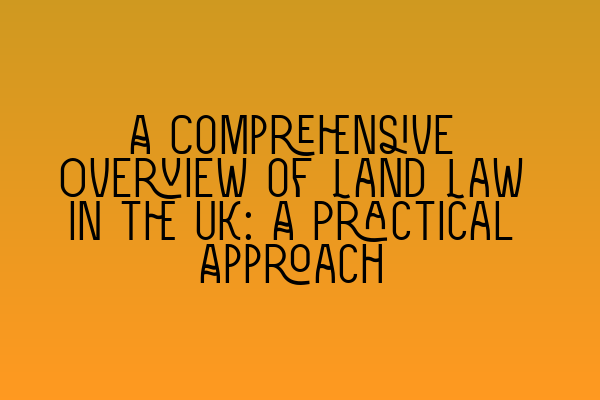A Comprehensive Overview of Land Law in the UK: A Practical Approach
When it comes to property matters, understanding land law in the UK is of utmost importance. Whether you are a property owner, a tenant, or an aspiring lawyer, having a firm grasp of the fundamentals of land law can help you navigate through various legal issues that may arise.
1. Introduction
Land law is a complex area of law that governs the rights and interests associated with land and immovable property. It encompasses a wide range of legal principles, statutes, and case law that regulate land transactions, ownership, and usage.
In this comprehensive overview, we will discuss the key aspects of land law in the UK, providing you with a practical and easy-to-understand approach.
2. Land Ownership
One of the fundamental concepts in land law is land ownership. Understanding the different types of land ownership and the legal rights that come with each type is crucial. There are two main types of land ownership: freehold and leasehold.
SQE 1 Practice Mocks FLK1 FLK2
2.1 Freehold
In a freehold ownership, the individual owns both the land and any buildings or structures on it. This type of ownership provides the greatest degree of control and rights over the property. Freehold ownership is typically indefinite and can be passed down through generations.
2.2 Leasehold
Leasehold ownership, on the other hand, grants the individual the right to use and occupy the land and property for a fixed period of time. The land is owned by a freeholder, and the leaseholder pays rent and adheres to certain conditions outlined in the lease agreement.
3. Land Registration
In the UK, land registration is governed by the Land Registration Act 2002. The act requires most properties to be registered with the Land Registry, which maintains an up-to-date record of land ownership and interests.
Land registration provides certainty and security for both property owners and potential purchasers, as it establishes a clear and definitive record of ownership and any relevant rights or restrictions on the property.
4. Easements
Easements are important rights that allow individuals to use another person’s land for a specific purpose. Common examples include rights of way, rights to light, and rights to access utilities such as water and electricity. Easements are typically created by express grant, by implication, or by prescription.
5. Covenants
Covenants are legal obligations that pertain to the use, maintenance, or restriction of land or property. They are often included in contracts or deeds and bind the successors in title. There are two types of covenants: positive covenants and restrictive covenants.
Positive covenants require the owner of the land to do something, such as maintain a fence or contribute to the cost of communal maintenance. Restrictive covenants, on the other hand, impose restrictions on the use or development of the land, such as prohibiting certain activities or construction.
6. Mortgages
A mortgage is a legal arrangement in which a lender provides financing to a borrower for the purchase of property. The property itself serves as security for the loan. If the borrower fails to repay the mortgage, the lender has the right to sell the property to recover the debt.
7. Land Disputes
Land disputes can arise for various reasons, such as boundary disagreements, rights of way disputes, or disputes over easements or restrictive covenants. Resolving land disputes often involves negotiation, mediation, or, in some cases, litigation through the courts.
8. Conclusion
Land law is a complex and diverse field that plays a crucial role in property transactions and disputes. Understanding the key concepts and principles of land law can help individuals make informed decisions and effectively manage legal issues related to land and property.
If you are preparing for the SQE exams, we recommend checking out our related articles on the SQE 1 Practice Exam Questions, SQE 1 Practice Mocks FLK1 FLK2, SQE 2 Preparation Courses, SQE 1 Preparation Courses, and SRA SQE Exam Dates. These resources can provide you with valuable insights and help you succeed in your studies.
